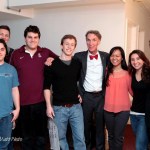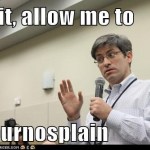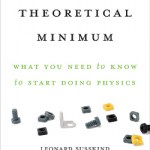Science
Kind of short notice, but if you're in the appropriate bits of Ohio, you might be interested to know that I'm giving two talks at Wright State this Thursday. At 11am, I'm doing the Physics Department Colloquium in 202 Oelman Hall, "Talking to My Dog About Science: Why Public Communication of Science Matters, and How Social Media Can Help":
Budget cuts and funding instability are a constant source of anxiety for professional scientists, and public uncertainty about science threatens to derail critical policy actions in areas like climate change and public health. I will argue that these…
There are many fallacies that undergird alternative medicine, which evolved into "complementary and alternative medicine" (CAM), and for which the preferred term among its advocates is now "integrative medicine," meant to imply the "best of both worlds." If I had to pick one fallacy that rules above all among proponents of CAM/IM, it would have to be either the naturalistic fallacy (i.e., that if it's natural—whatever that means—it must be better) or the fallacy of antiquity (i.e., that if it's really old, it must be better). Of course, the two fallacies are not unrelated. In the minds of CAM…
You've probably heard this explanation for the virtue of religion: that even if god doesn't exist, belief in god (or some other monitoring authority) makes people behave more morally. There have been many experiments that have actually shown that people are nicer or more generous when exposed to religious concepts, such as this one by Norenzayan and Shariff.
In one of their own studies, they primed half the participants with a spirituality-themed word jumble (including the words divine and God) and gave the other half the same task with nonspiritual words. Then, they gave all the participants…
this is not a Planck post...
Visalization of the Gödel Universe
WMAP-9
Who Wrote Shakespeare's Plays? - Astrophysicist lets you pick the priors and decide...
Harvard did WHAT?
"Detection of Carbon Monoxide and Water Absorption Lines in an Exoplanet Atmosphere" - Konopacky et al Science (sub) - HR8799 good S/N spectra
"Direct imaging discovery of 12-14 Jupiter mass object orbiting a young binary system of very low-mass stars" - Delorme et al (arXiv) - substellar circumbinary companion to an M dwarf binary
why, yes, I am procrastinating...
and there is Moore:
Moore's Law in Astronomy and UFOs…
Yesterday's big post on why I think people should embrace scientific thinking in a more conscious way than they do already (because my claim is that most people already use scientific thinking, they're just not aware that they're doing it) is clearly a kind of explanation of the reason behind my next book, but what about the previous two? How does teaching people about modern physics through imaginary conversations with my dog serve the general goal of getting people to think more scientifically?
The following is a bit of a retcon-- after all, the proximate cause of my writing those books was…
As you may or may not know, I'm currently at work on a book called How to Think Like a Scientist. This raises the fairly obvious question in the post title, namely, why should people think like scientists? What's the point?
In a sense, this is (as Ethan Zuckerman pointed out at lunch the other day) the underlying question at the heart of the whole endeavor of science communication. I mean, I've written two books about modern physics for a general audience, and when I have time, I write this blog aimed at non-scientists. What's the point of doing all that, anyway? What is it I hope to achieve…
OK, Daddy, guess what? Here's my idea. We get a stick of wood and we put a timer on it, then we get a big rock and put it on the end. We have to put feet on the big rock, so it can stand on the stick.
Then when the rain comes down, down, down, we push really hard on the stick. We have to do a really big push, then the rock will go up in the air and come down, and the mountain will grow. Then we measure how much weight it took, and how much damage it did when it hit the ground. With the timer. Which isn't a timer, it's a scale.
That's what we're going to do tomorrow!
SteelyKid's plan for…
I had lunch with Ethan Zuckerman yesterday, and we were talking about technology and communicating science to a mass audience, and Michio Kaku came up. Specifically, the fact that he's prone to saying stuff that's just flat wrong, if not batshit crazy-- see this angry post from 2010 for an example.
It was amusing, then, to return to my RSS reader and find first Sean Carroll and then Matt Strassler expressing outrage and annoyance over some incredibly dumb things Kaku said about the Higgs Boson. My initial reaction was along the lines of "Yeah, welcome to the club," but I suspect that that's…
On Twitter and blogs, we're having another round of complaints about sensationalism and hype in science stories-- Matthew Francis and Gabrielle Rabinowitz are the latest to cross my social media feeds. I've also seen some stories recently (that I'm too lazy to dig up) complaining about the latest Higgs Boson stuff, and I'm sure if you wait ten minutes there'll be a biologist upset about something in Science this week.
The basic form of this is nothing particularly new: the argument is that by representing incremental improvements in science as Revolutionary! Developments! the media are…
It's been a long time, been a long time, been a long lonely, lonely, lonely, lonely time.
Besides indulging my taste for shamelessly working lyrics from Led Zeppelin and other classic bands into my post, what am I talking about? Simple. Things have been way too serious lately. I mean, just look at yesterday's post. Sure, I framed it semi-humorously, with The Evil Skeptics infiltrating the screening of the Burzynski sequel, but part of the reason that I did that is because the subject matter is so unrelentingly depressing. That's why when a reader sent me a link to the victim target subject of…
In the twelve years I've been at Union, there are only two times I've tried to go to an evening speaker and been turned away. Once was 4-5 years ago, when Maya Angelou spoke on campus, the second time was last night, when Bill Nye the Science Guy spoke. I managed to make it to the foot of the steps of Memorial Chapel before they hit the fire code (939, I think they said the number was) and turned everybody away. There were probably 20-30 students behind me in the line, so even if I had made it all the way to the front, I might've stepped aside and let one of them in instead.
It's worth…
By USA Science & Engineering Festival Founder Larry Bock
"Somewhere, something incredible is waiting to be known." - Carl Sagan
The excitement, the rigors and the risk of scientific discovery: Sagan loved and shared these emotions more effectively and openly with us than perhaps any other contemporary scientist. And in the process he helped catapult "science outreach" into the public lexicon.
Today more than ever, if we are to inspire the next generation of innovators and better inform the public about science, we, with Sagan-like boldness, need to rethink science outreach,…
SteelyKid has started to demand Sid the Science Kid videos, which of course we are implacably opposed to around here. One of the recent episodes available online was "Slide to the Side," talking about friction. While this partakes a bit of the Feynman "Energy makes it go" problem, it was generally pretty good, and prompted a question from Kate that (combined with Rhett's latest.
Kate and SteelyKid were talking about how friction keeps things from sliding, then Kate asked me whether it would be possible to keep anything at rest on a truly frictionless surface, due to the rotation of the Earth…
My students are also blogging here:
My undergrad encounters
Developmental Biology
Miles' Devo Blog
Tavis Grorud’s Blog for Developmental Biology
Thang’s Blog
Heidi’s blog for Developmental Biology
Chelsae blog
Stacy’s Strange World of Developmental Biology
Thoughts of Developmental Biology
Biology~
A good portion of what I've been teaching so far uses Drosophila as a model system — it's the baseline for modern molecular genetics. Unfortunately, it's also a really weird animal: highly derived, specialized for rapid, robust development, and as we've learned more about it…
There was a lot of re-sharing yesterday of an article about the "Finkbeiner Test" to be applied to profiles of women scientists. This is analogous to the "Bechdel Test" in pop culture, which asks "Do two women talk to each other about something other than a man?", only because we're scientists, it's more complicated, hitting seven points:
To pass the Finkbeiner test, the story cannot mention
The fact that she’s a woman
Her husband’s job
Her child care arrangements
How she nurtures her underlings
How she was taken aback by the competitiveness in her field
How she’s such a role model for other…
One of the things that's been rattling around in my head since ScienceOnline back in January is the need for a greater diversity of voices in science communication generally. I don't mean diversity in the sense of racial and gender make-up of the people doing the communication, though that would be nice, I mean a greater diversity in the way people talk about science.
This started bugging me in the panel that led to the "Journosplain" image that I'm somewhat unfairly tagging as the "featured image" for this post (grabbed from here)-- somewhat, because it's not really Carl Zimmer's fault. But…
Over the weekend, as I was contemplating what to write about for today, I received a rather odd and unexpected e-mail. Indeed, it was with great surprise that I read this e-mail on Saturday morning, sent to the Burzynski Movie mailing list:
Dear Burzynski Movie Subscribers:
Major International Distribution Deal For
Burzynski: Cancer Is Serious Business, Part II:
We are pleased to announce that Burzynski: Cancer Is Serious Business, Part II has landed a major international distribution deal with one of America's top distribution companies.
We can't give out any specific details until…
Western, Educated, Industrialized, Rich, and Democratic, that is. One of the common complaints about evolutionary psychology is that it claims to be addressing evolved human universals, but when you look at the data sets, they are almost always drawn from the same tiny pool of outliers, Western undergraduate students enrolled in psychology programs, and excessively extrapolated to be representative of Homo sapiens — when we're actually a very peculiar group.
How peculiar? A paper by Heinrich, Heine, and Norenzayan, "The Weirdest People in the World", tries to measure that…and by nearly every…
This is the physics book that's generating the most buzz just at the moment, by noted string theorist Leonard Susskind and George Hrabovsky, based on a general-audience course Susskind's been running for years. It's doing very well, with an Amazon rank in the 300's, which is kind of remarkable for a book with this many equations. Using calculus, even.
Odd though it might seem given the mathematical content, this is a book that has a lot in common with Cox and Forshaw's Why Does E=Mc2?. By which I mean that it sets out to present a very particular take on theoretical physics to a general…
Sequestration begins on Friday, and this time for real... it is, ironically, Hubble Space Telescope Proposal Deadline Day, but then everyday is a Proposal Day.
I'm guessing that this year the "Hubble Constant" will decrease.
The Agencies are now revealing their plans to deal with sequester.
As you recall the amount is $83 billion from the current fiscal year's budget.
We are almost half way through the current fiscal year.
There is not actually a budget yet for the current fiscal year, the US is operating on a Continuing Resolution through to late March, and if a budget is actually approved,…









